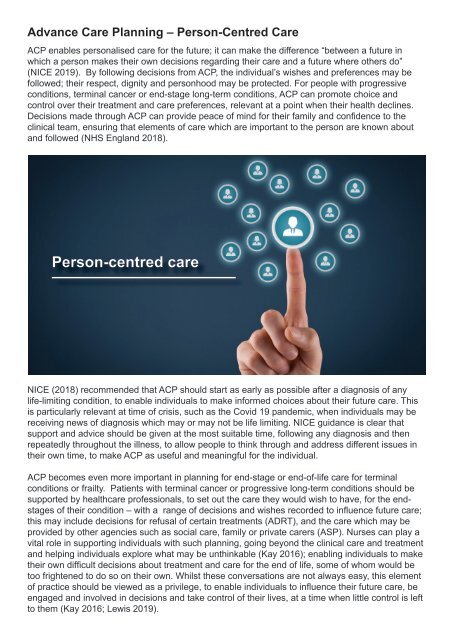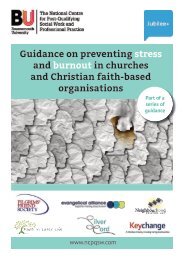Advance Care Planning
Advance care planning is a process that supports adults at any age or stage of health in understanding and sharing their personal values, life goals, and preferences regarding future medical care. The goal of advance care planning is to help ensure that people receive medical care that is consistent with their values, goals and preferences during serious and chronic illness.
Advance care planning is a process that supports adults at any age or stage of health in understanding and sharing their personal values, life goals, and preferences regarding future medical care. The goal of advance care planning is to help ensure that people receive medical care that is consistent with their values, goals and preferences during serious and chronic illness.
Create successful ePaper yourself
Turn your PDF publications into a flip-book with our unique Google optimized e-Paper software.
<strong>Advance</strong> <strong>Care</strong> <strong>Planning</strong> – Person-Centred <strong>Care</strong><br />
ACP enables personalised care for the future; it can make the difference “between a future in<br />
which a person makes their own decisions regarding their care and a future where others do”<br />
(NICE 2019). By following decisions from ACP, the individual’s wishes and preferences may be<br />
followed; their respect, dignity and personhood may be protected. For people with progressive<br />
conditions, terminal cancer or end-stage long-term conditions, ACP can promote choice and<br />
control over their treatment and care preferences, relevant at a point when their health declines.<br />
Decisions made through ACP can provide peace of mind for their family and confidence to the<br />
clinical team, ensuring that elements of care which are important to the person are known about<br />
and followed (NHS England 2018).<br />
Person-centred care<br />
NICE (2018) recommended that ACP should start as early as possible after a diagnosis of any<br />
life-limiting condition, to enable individuals to make informed choices about their future care. This<br />
is particularly relevant at time of crisis, such as the Covid 19 pandemic, when individuals may be<br />
receiving news of diagnosis which may or may not be life limiting. NICE guidance is clear that<br />
support and advice should be given at the most suitable time, following any diagnosis and then<br />
repeatedly throughout the illness, to allow people to think through and address different issues in<br />
their own time, to make ACP as useful and meaningful for the individual.<br />
ACP becomes even more important in planning for end-stage or end-of-life care for terminal<br />
conditions or frailty. Patients with terminal cancer or progressive long-term conditions should be<br />
supported by healthcare professionals, to set out the care they would wish to have, for the endstages<br />
of their condition – with a range of decisions and wishes recorded to influence future care;<br />
this may include decisions for refusal of certain treatments (ADRT), and the care which may be<br />
provided by other agencies such as social care, family or private carers (ASP). Nurses can play a<br />
vital role in supporting individuals with such planning, going beyond the clinical care and treatment<br />
and helping individuals explore what may be unthinkable (Kay 2016); enabling individuals to make<br />
their own difficult decisions about treatment and care for the end of life, some of whom would be<br />
too frightened to do so on their own. Whilst these conversations are not always easy, this element<br />
of practice should be viewed as a privilege, to enable individuals to influence their future care, be<br />
engaged and involved in decisions and take control of their lives, at a time when little control is left<br />
to them (Kay 2016; Lewis 2019).



